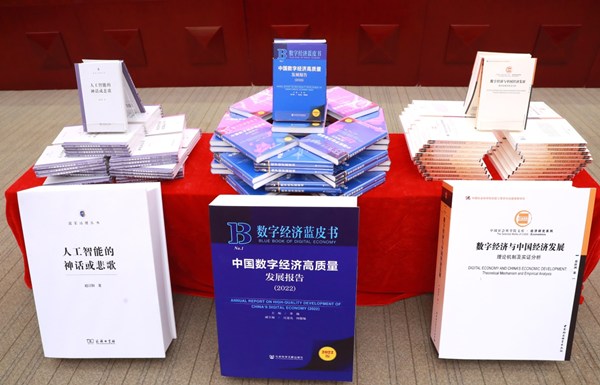
Major research outcomes on AI and digital economy recently unveiled by CASS Photo: Zhu Gaolei/CSST
On April 3, the Chinese Academy of Social Sciences (CASS) held a press conference to release three major outcomes on artificial intelligence (AI) and the digital economy, namely Annual Report on High-Quality Development of China’s Digital Economy (2022), Digital Economy and China’s Economic Development: Theoretical Mechanism and Empirical Analysis, and Myth or Elegy of Artificial Intelligence.
Zooming in on the digital economy, a new form of economic development, the three works offer in-depth summaries of theories and practices concerning the development of China’s digital economy and examine positive shifts in the country’s development model, contributing experience and wisdom to China’s push to build a new development pattern and advance high-quality development.
Impact of digital economy
The Annual Report on High-Quality Development of China’s Digital Economy (2022) was compiled under the chief editorship of CASS Member Li Yang and the deputy editorship of Shen Jianguang, vice president of JD.COM and an adjunct professor of economics at Fudan University, and He Dexu, a research fellow and director of the National Academy of Economic Strategy at CASS. It aims to keep an accurate record of the development course of China’s digital economy, analyze prominent problems therein, and sum up the basic operational logic of the digital economy.
According to the report, the digital economy has deeply impacted the taxation system, intergovernmental tax division, interest rate formation mechanism, risks of special bonds, and financing for small and medium-sized enterprises. It is conducive to promoting green development, rural revitalization, and urban construction. At the same time, China’s digital economy faces such problems as disordered expansion and monopoly of capital, inadequate protection of personal information, and weak data security, which should be effectively addressed in the process of normalized development.
Data as production factor
The Digital Economy and China’s Economic Development: Theoretical Mechanism and Empirical Analysis authored by Cai Yuezhou, a research fellow from the Institute of Quantitative and Technological Economics at CASS, clarifies the connotation of digital technology and digital economy from the three different perspectives of digital industrialization; industrial digitalization; and new technology, new factor, and new infrastructure, reviewing the theoretical mechanism for the impact of digital technology and digital economy on high-quality economic development.
The work emphasizes the crucial role of data as a production factor and argues that techno-economic features of the data factor, such as non-competitiveness, low costs of replication, non-exclusiveness, externality, and instantaneity, lay a micro foundation for enhancing enterprises’ production and operational efficiency, multiplying capacities for value creation, increasing consumer surplus and benefits, and bolstering high-quality development.
Myth of humanity questioned
The book Myth or Elegy of Artificial Intelligence, written by Zhao Tingyang, a CASS Member and research fellow from the Institute of Philosophy at CASS, is a collection of papers on philosophy of science and technology. Most of the articles shed light on AI, with a few studying gene editing and one discussing “cosmic sociology,” a theory envisioned by renowned Chinese science fiction writer Liu Cixin in his Hugo Award-winning trilogy The Three-Body Problem. Although an unofficial discipline, cosmic sociology has important realistic relevance.
With frontier academic value, Zhao’s work focuses on the essence and differentiation of AI, as well as its hazards and their potential solutions. Godless modernity is a myth about human subjectivity. Regarded as “God” instead, humans want everything and desire to succeed in all. The myth of humanity is so well established that it has irresistibly become a self-fulfilling prophecy. More horrifyingly, the myth has a structure of self-relation. Even the subversion against subjectivity should be based on subjectivity.
In modern times, many thinkers have critically reflected on modernity, subjectivity, and the cult of science, and those reflections have long been widely known discourse. Nonetheless, such discourse is useless and completely incapable of containing the myth of humanity. According to Zhao, however, the myth of humanity, or the myth of subjectivity, including myths concerning AI and genetic science, might harbor elegies of humanity.
The conference is the second of its kind following CASS’s launch of a platform to unveil its major outcomes on a monthly basis in order to better support the government’s decision making, spur academic development, popularize knowledge, and serve international communication purposes.
Add: #5 Jianguomennei Street, Beijing, 100732,P.R.China
Copyright by CASS. All Rights Reserved

